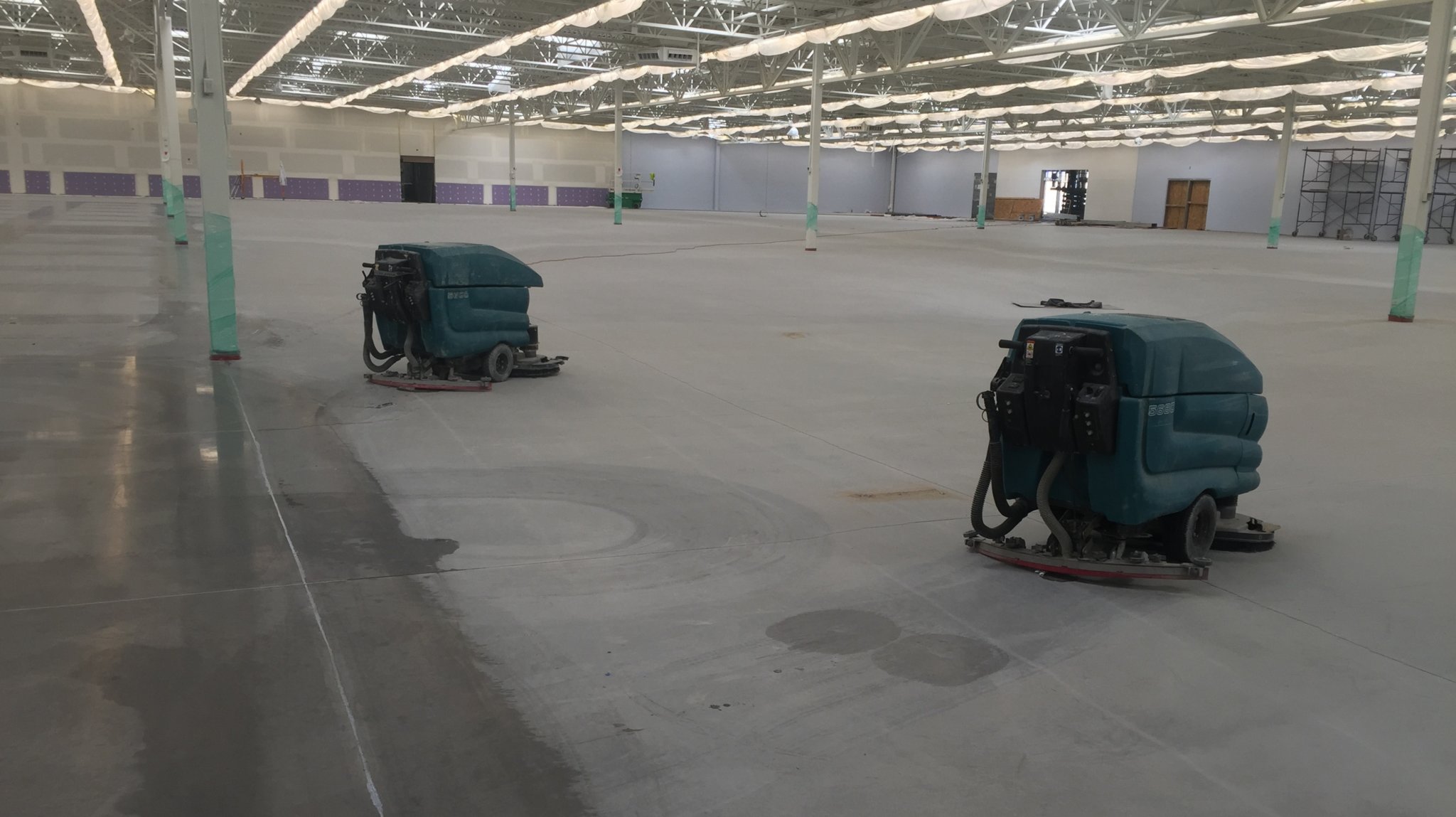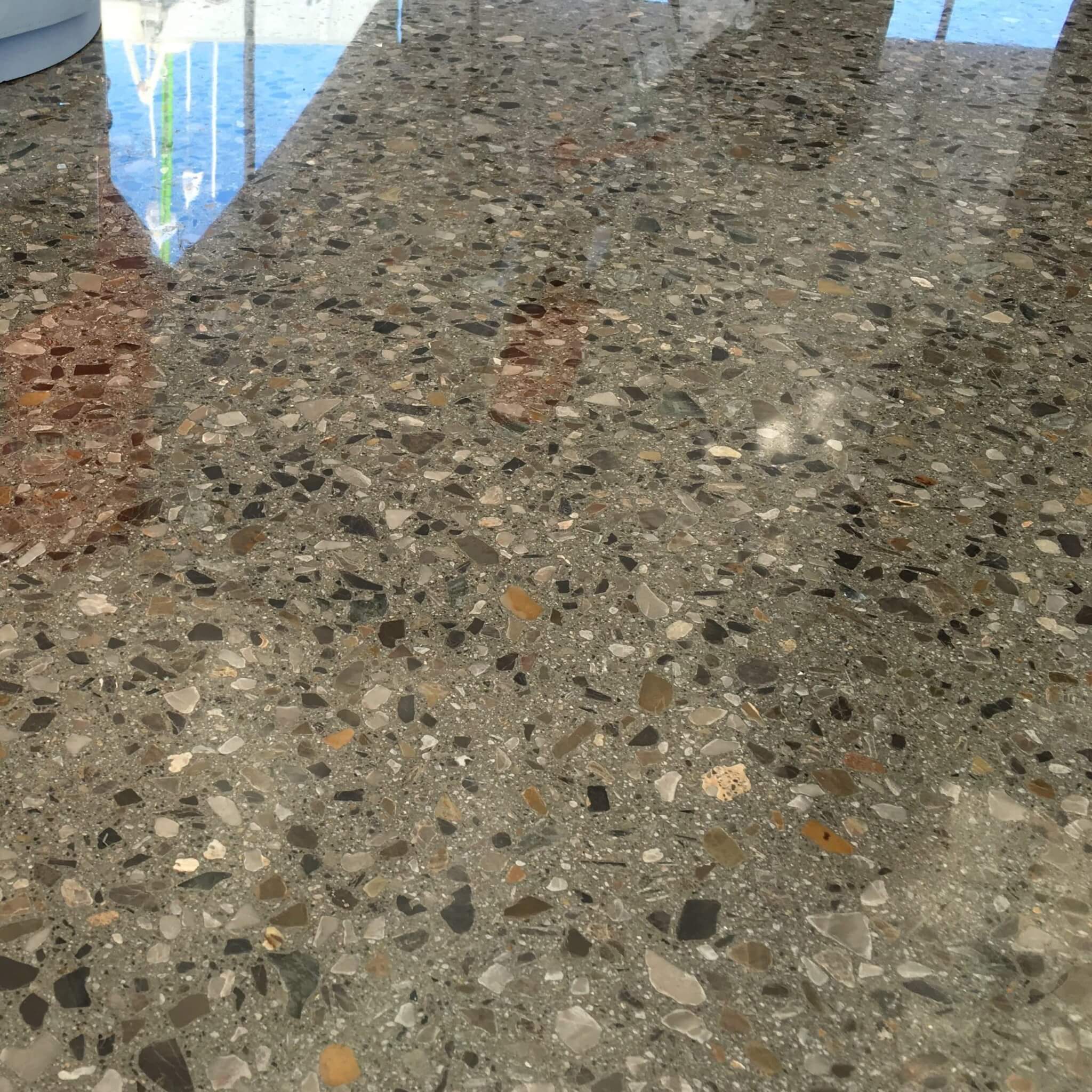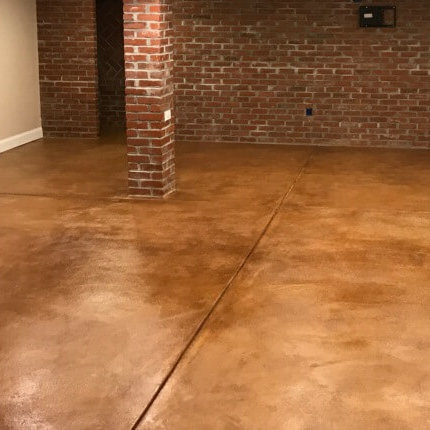Sealed Concrete
USA Renovations provides sealed concrete services across the nation. Whether you are a general contractor or direct buyer, we want to work with you and provide the best sealed concrete service possible.
What is sealed concrete?
Concrete sealers are applied to concrete to protect it from surface corrosion, staining and damage. They either block the pores in the concrete to reduce the absorption of water and salts or form an impermeable layer that prevents such materials from passing.
For a transparently exposed concrete finish that needs a protective barrier at the surface, sealed concrete is an excellent and economical choice.
Sealed concrete is designed to repel spills while keeping the surface of the concrete looking top-notch.
Sealed concrete has been a top pick for large warehouses, cross-docks, and commercial settings.
It is important to know there are penetrating and topical sealers available on the market today. Knowing the difference is important when choosing the best finish for your project.
Penetrating Sealers are made with a reactive chemical called a “densifier” that modifies the surface of the concrete. A concrete densifier is a chemical applied to a concrete surface in order to fill pores, increasing surface density. The application of a densifier ultimately impregnates the surface of the concrete, strengthening the surface PSI while allowing it to remain a breathable finish.
This sealer is available in several different forms, with the most popular being a Sodium, Lithium, or Potassium Silicate. This higher PSI reduces the chances of concrete dusting and surface scratches.
About this Process
Applications of sealed concrete products can be tricky with different porosity levels scattered through the surface of the slab. Utilizing the professionals at USA Renovations your installation will be performed with ease with a great overall finish. Below are the steps involved when staining a concrete surface:
- Preparation
- Application
- Final Clean

Call For a Quote:
(877) 935-9411
F.A.Q.
We understand that you may have questions that come up regarding sealed concrete. Let us help!
What are the benefits of polished concrete?
A Sealed Concrete floor continues to be a popular choice among all large concrete surface locations. Sealed Concrete has several advantages over alternative surfaces.
- Water Resistant/Proof – Penetrating sealers are designed to chemically adhere to the slabs pours. In doing so, the surface ends up with less porosity which when a liquid hits the surface the finish will resist the liquid. As for topical sealers, these products are designed to repel liquids entirely. It is important to consult with our professionals to determine which is best for your applications.
- No Dusting – Leaving your concrete slab unprotected allows the surface to dust. This takes place with foot traffic, forklifts, or any type of surface wear that releases small particles of the untreated surface that is classified as concrete dusting. Regardless of the sealer you chose, it will eliminate concrete dusting.
- Application Time – With curing times being relatively low, large spaces can be turned over quickly to reduce down time. With a wide verity of systems, our professionals will design a system that is the best fit for your time frame and level of protection required.
- Budget Friendly – Sealed Concrete is by far the most inexpensive finish that will protect your slab from the elements while keeping the great look of an exposed concrete slab.
What is the difference between a topical sealer and a penetrating sealer?
When choosing a Sealed Concrete finish, it is important to know the differences between a Topical and a Penetrating Sealer:
Topical Sealers
Topical sealers bond to the surface of the concrete forming a barrier between the concrete slab and the elements protecting the surface from oils, liquids, chemicals, salts, and many other penetrating fluids from penetrating the slab through pores at the surface. Topical sealers are better known as epoxy, acrylic, and urethane top coats. Although Topical Sealers are best at protecting the concrete from the elements, the costs are much greater than a polished concrete floor or densified finish. In addition, as with all topical finishes, this will need to be monitored long term as reapplication may be necessary.
Penetrating Sealers
Penetrating Sealers are made with a reactive chemical called a “densifier” that modifies the surface of the concrete. A concrete densifier is a chemical applied to a concrete surface in order to fill pores, increasing surface density. The application of a densifier ultimately impregnates the surface of the concrete, strengthening the surface PSI while allowing it to remain a breathable finish.
This sealer is available in several different forms, with the most popular being a Sodium, Lithium, or Potassium Silicate. This higher PSI reduces the chances of concrete dusting and surface scratches.
What is coefficient of friction and why does it matter?
A safe floor must have high levels of friction at the surface which is measured by a coefficient of friction rating. This measurement declares whether a floor will have a high or low probability of a slip and fall. The higher the rating of the coefficient of friction, the lower the chances are of slipping: whereas the smaller the rating, the greater the risk. For standard shoes, a concrete floor surface will displace a coefficient that is high enough to predetermine the reasonable probability of slipping.
The following list provides an average of values:
- Thick grit quartz floors: .85 – 1
- Aluminum oxide grit epoxy floors: .65 – .80
- Tennant High Traffic System Floors: .65 – .68
- Broom finished bare concrete floors: .60 – .70
- Epoxy or Urethane floors with Sharkgrip additive: .55 – .60
- Bare concrete, non-broom finished floor: .55 – .60
- Steel troweled, bare concrete, non-broom finished floor: .50 – .55
- Solid epoxy or urethane floor with no grit added: .50 – .55
- Linoleum floor: .30 – .50 (depending on how heavily waxed)
What options do I have when it comes to sealed concrete?
DENSIFIERS (GOOD)
As a single component, these sealers are generally the most cost-effective. The densifier is made up of silicates and other proprietary blends that when applied to the surface of the concrete, the chemicals permanently react which results in increasing the strength of the surface. With a stronger slab surface and less porosity, the concrete is now able to withstand additional wear and tear. Additionally, liquid penetration is reduced, but the slab will still remain porous.
ACRYLICS (BETTER)
As a single component and entering into the topical sealing category, acrylic sealers form a protective film over the concrete surface protecting the concrete from moisture penetration. The film is clear and cures without the appearance of a sheen. Still budget-friendly, these sealers are designed for light foot traffic. We do not recommend acrylics in high traffic areas.
POLYURETHANES (BEST)
As a two-part component, polyurethanes begin to step into the epoxy category. This product is a resin with a hardener and a catalyst that when blended, reacts forming a hard topical surface that protects the concrete from continuous exposure to oils, liquids, and other fluids that may penetrate into the slabs pours.
These thin polyurethane coatings generally are twice the thickness of acrylics, allowing for additional protection and longevity. This product is becoming increasingly popular as an alternative to polished concrete with a clear polyurethane topcoat over ground concrete. By installing over a refined surface, you can achieve the look of an exposed shiny surface with the inherent benefits of a truly sealed floor.
Related Services
Polished Concrete
In this multi-step process, the concrete floor is mechanically ground, honed and polished with bonded abrasives in order to cut a concrete floor’s surface.
Stained Concrete
With its warm and inviting appearance, Stained Concrete will continue to be a top pick within the concrete finishes sector.
Epoxy Flooring
A top pick for decades for those projects that demand a strong floor, epoxy will seal and protect the surface from chemicals or blunt force.


